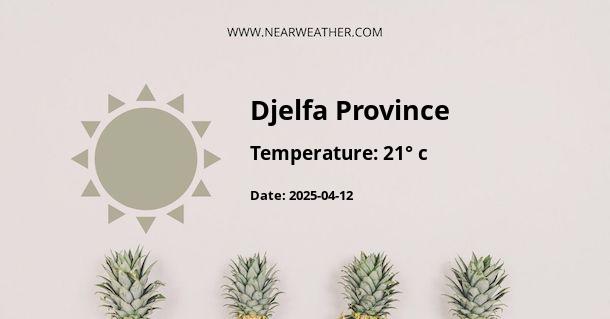Climate and Weather in Djelfa, Algeria
Djelfa is a city located in the Wilaya (province) of Djelfa, Algeria. It is situated in the northern part of the Sahara Desert, making its climate and weather unique and distinct. In this article, we will explore the different aspects of the climate in Djelfa, including temperature, precipitation, and seasonal variations.
Temperature
Djelfa experiences a desert climate, characterized by hot summers and cool winters. The city is known for its extreme temperature fluctuations throughout the year. Summers are scorching hot, with average high temperatures reaching around 40°C (104°F) during the day. Nighttime temperatures during the summer months can drop to around 20°C (68°F), providing some relief from the intense heat.
Winters in Djelfa are relatively mild compared to the scorching summers. Average high temperatures during the winter months range from 10°C to 15°C (50°F to 59°F), while nighttime temperatures can drop to around 0°C (32°F). It is not uncommon for Djelfa to experience occasional frost and even light snowfall during the winter season.
Precipitation
Djelfa is known for its arid climate with very low annual precipitation. The city receives an average of 150 mm (6 inches) of rainfall per year, mainly occurring during the winter months. The majority of the precipitation in Djelfa is in the form of light showers and occasional thunderstorms. The rainy season typically peaks in January and February.
Due to its proximity to the Sahara Desert, Djelfa experiences a phenomenon known as "Saharan Dust." This is when dust particles from the desert are carried by winds and can occasionally lead to hazy or dusty conditions in the city, especially during the dry season.
Seasonal Variations
Djelfa experiences distinct seasonal variations throughout the year. The summer season, from June to September, is characterized by scorching heat and low humidity. It is the driest period of the year, with almost no rainfall. The extreme temperatures during this season make it essential to take precautions to avoid heat-related illnesses.
Autumn, from October to November, is a transitional season in Djelfa. Temperatures start to decrease gradually, and occasional rainfall occurs. This season is considered pleasant, with temperatures ranging between 20°C and 30°C (68°F and 86°F).
Winter, from December to February, is the coldest season in Djelfa. Temperatures are mild during the day, but cold at night. Occasional frost and light snowfall can occur, creating a unique scenery in the desert landscape.
Spring, from March to May, is another transitional season characterized by increasing temperatures and occasional rainfall. The weather becomes more pleasant, with temperatures ranging from 15°C to 25°C (59°F to 77°F).
Conclusion
The climate in Djelfa, Algeria, is typical of a desert region, with scorching hot summers and cool winters. The city experiences low annual precipitation, with most rainfall occurring during the winter months. Djelfa's unique climate and weather patterns make it an interesting destination for travelers looking to experience the beauty of the Sahara Desert.
A - Djelfa Province's Latitude is 34.333328 & Longitude is 3.666670.
A - Weather in Djelfa Province is 21° today.
A - Climate Conditions in Djelfa Province shows overcast clouds today.
A - Humidity in Djelfa Province is 19% today.
A - Wind speed in Djelfa Province is 13.5 km/h, flowing at 233° wind direction. today.
